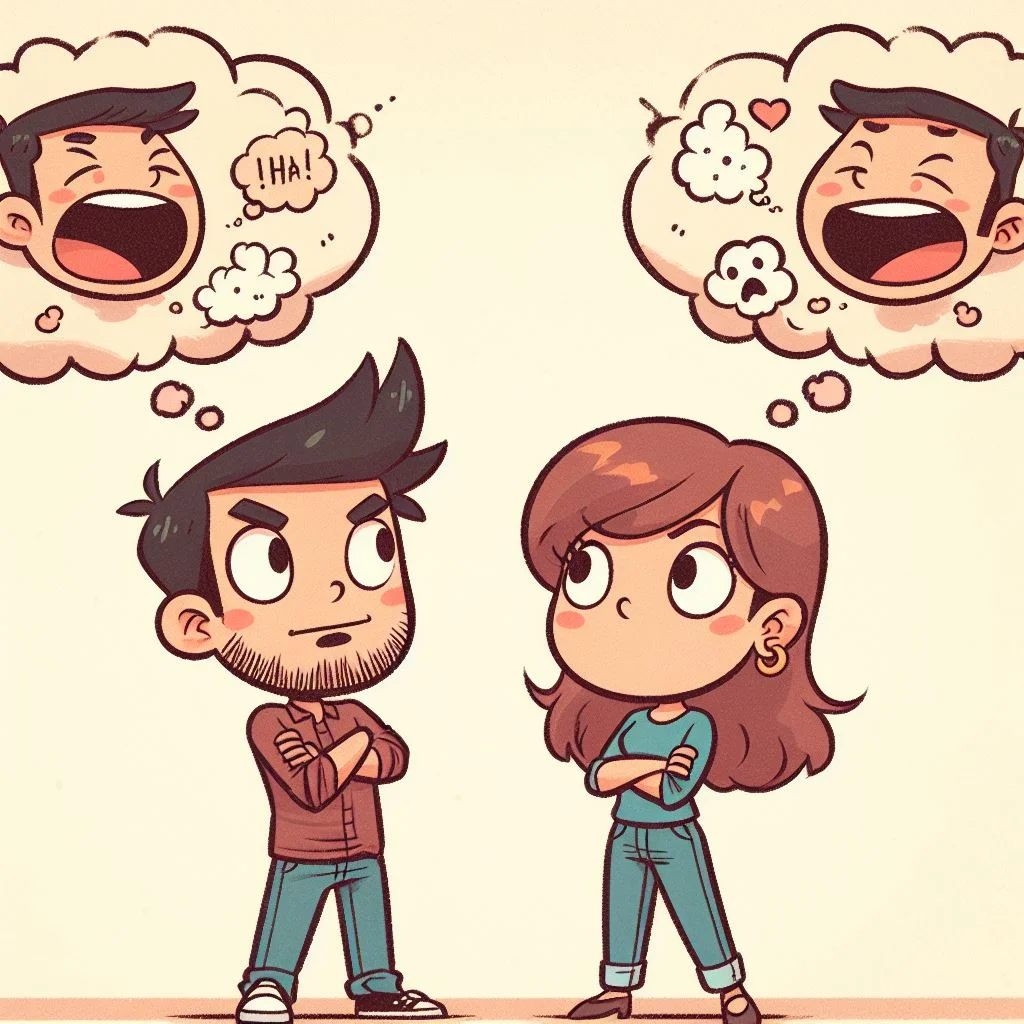Why Does My Girlfriend Hate Me? Understanding And Rebuilding Your Relationship
Have you ever wondered, "Why does my girlfriend hate me?" If you're feeling distant or sensing negativity in your relationship, it's essential to address these concerns constructively. Relationships are complex, and misunderstandings can easily arise. However, with the right approach, you can uncover the root causes of the problem and work toward healing together.
Feeling like your girlfriend dislikes you can be overwhelming, but it's crucial to approach the situation with empathy and understanding. Many factors can contribute to this feeling, including communication issues, unresolved conflicts, or external stressors. Recognizing these factors is the first step toward resolving them.
This comprehensive guide will explore the reasons behind this emotional turmoil and provide actionable advice to improve your relationship. By understanding your partner's perspective and working collaboratively, you can rebuild trust and strengthen your bond.
Read also:Prestige Produce Your Ultimate Guide To Fresh Highquality Fruits And Vegetables
Table of Contents
- Understanding the Problem: Why Does My Girlfriend Hate Me?
- Common Relationship Issues That Cause Conflict
- Improving Communication in Relationships
- Rebuilding Trust and Emotional Connection
- Developing Empathy and Understanding
- Practicing Self-Reflection and Personal Growth
- Setting Healthy Boundaries
- Effective Conflict Resolution Techniques
- When to Seek Professional Help
- Conclusion: Moving Forward Together
Understanding the Problem: Why Does My Girlfriend Hate Me?
When you feel like your girlfriend dislikes you, it's important to approach the situation objectively. While emotions may run high, understanding the underlying causes is key to resolving the issue. Below are some common reasons why your girlfriend might seem distant or unhappy:
- Miscommunication: Misunderstandings can lead to frustration and resentment.
- Unresolved Issues: Lingering problems in the relationship can create tension.
- External Stress: Outside pressures, such as work or family, can affect how she interacts with you.
It's essential to differentiate between genuine dislike and temporary dissatisfaction. By addressing these concerns openly, you can work toward a healthier relationship.
Identifying the Signs of Relationship Strain
Pay attention to subtle cues that indicate relationship issues. For example:
- She avoids spending time with you.
- She seems disinterested in conversations or activities.
- She expresses frustration or anger more frequently.
Recognizing these signs early can help you address the problem before it escalates.
Common Relationship Issues That Cause Conflict
Several factors can contribute to relationship dissatisfaction. Understanding these issues can help you identify what might be affecting your relationship:
- Different Expectations: Mismatched expectations about roles or responsibilities.
- Emotional Needs: Unmet emotional needs leading to frustration.
- Trust Issues: Past betrayals or broken promises.
Addressing these issues requires patience and open communication. By working together, you can overcome these challenges.
Read also:Duane Park Patisserie New York Ny Your Ultimate Dessert Haven
Statistical Insights on Relationship Conflicts
According to a study published in the Journal of Marriage and Family, communication problems are one of the leading causes of relationship dissatisfaction. Additionally, researchers found that couples who actively work on their communication skills report higher relationship satisfaction.
Improving Communication in Relationships
Effective communication is the foundation of any successful relationship. If you're wondering why your girlfriend seems distant, improving your communication skills can make a significant difference:
- Active Listening: Focus on understanding her perspective without interrupting.
- Open Dialogue: Encourage honest conversations about feelings and concerns.
- Nonverbal Cues: Pay attention to body language and tone of voice.
By fostering open communication, you can address underlying issues and strengthen your bond.
Practical Tips for Better Communication
Here are some actionable steps to enhance your communication:
- Schedule regular check-ins to discuss relationship dynamics.
- Use "I" statements to express your feelings without blaming.
- Acknowledge her emotions and validate her concerns.
Rebuilding Trust and Emotional Connection
Trust is a critical component of any relationship. If trust has been broken, it's essential to take steps to rebuild it. This process requires transparency, consistency, and effort from both partners:
- Be Honest: Share your thoughts and feelings openly.
- Follow Through: Keep promises and commitments.
- Show Support: Be there for her during difficult times.
Rebuilding trust takes time, but with dedication, you can restore the emotional connection.
Strengthening Emotional Intimacy
Emotional intimacy involves understanding and supporting each other on a deeper level. To strengthen this connection:
- Engage in meaningful conversations.
- Plan activities that promote bonding.
- Express appreciation and gratitude regularly.
Developing Empathy and Understanding
Empathy is the ability to understand and share the feelings of others. By developing empathy, you can better comprehend your girlfriend's perspective and address her concerns:
- Put Yourself in Her Shoes: Consider how she might feel in different situations.
- Avoid Judgment: Listen without immediately offering solutions or criticism.
- Show Compassion: Offer support and understanding when she's struggling.
Empathy fosters a deeper connection and promotes mutual respect.
Practicing Emotional Intelligence
Emotional intelligence involves recognizing and managing your own emotions while understanding those of others. To improve your emotional intelligence:
- Reflect on your emotional responses.
- Practice mindfulness and self-awareness.
- Seek feedback from trusted friends or family.
Practicing Self-Reflection and Personal Growth
Personal growth is essential for maintaining a healthy relationship. By reflecting on your own behaviors and attitudes, you can identify areas for improvement:
- Identify Patterns: Recognize recurring issues in your relationships.
- Seek Feedback: Ask your partner for constructive criticism.
- Set Goals: Work on improving specific aspects of your personality.
Self-reflection helps you become a better partner and contributes to a stronger relationship.
Benefits of Personal Growth in Relationships
Investing in personal growth benefits both you and your relationship. Studies show that individuals who prioritize self-improvement report higher relationship satisfaction. By focusing on growth, you can create a more fulfilling partnership.
Setting Healthy Boundaries
Healthy boundaries are crucial for maintaining respect and balance in a relationship. If you're wondering why your girlfriend seems distant, it might be related to boundary issues:
- Respect Her Space: Allow her time for personal activities.
- Communicate Expectations: Discuss what boundaries are important to each of you.
- Enforce Limits: Establish consequences for boundary violations.
By setting and respecting boundaries, you can create a more harmonious relationship.
Addressing Boundary Issues
If boundary issues are affecting your relationship, take the following steps:
- Have an open conversation about boundaries.
- Agree on specific limits and expectations.
- Monitor progress and adjust as needed.
Effective Conflict Resolution Techniques
Conflict is inevitable in any relationship, but how you handle it can make all the difference. Effective conflict resolution involves:
- Staying Calm: Avoid escalating arguments with anger or frustration.
- Focusing on Solutions: Work together to find mutually beneficial outcomes.
- Compromising When Necessary: Be willing to meet halfway on certain issues.
By approaching conflicts constructively, you can resolve disagreements and strengthen your relationship.
When to Take a Break
During heated arguments, it may be helpful to take a break to cool down. This allows both partners to reflect on the situation and approach the discussion with a clear mind.
When to Seek Professional Help
While many relationship issues can be resolved through communication and effort, some situations may require professional assistance. Consider seeking help if:
- You're unable to resolve recurring conflicts.
- Trust has been severely damaged.
- Emotional or physical abuse is present.
Therapists and counselors can provide valuable guidance and support in these situations.
Benefits of Relationship Counseling
Relationship counseling offers numerous benefits, including:
- Improved communication skills.
- Deeper emotional understanding.
- Strategies for conflict resolution.
Professional help can be a powerful tool for strengthening your relationship.
Conclusion: Moving Forward Together
Understanding why your girlfriend might dislike you involves addressing communication, trust, and emotional connection. By implementing the strategies outlined in this guide, you can work toward resolving conflicts and rebuilding your relationship. Remember, every relationship faces challenges, but with dedication and effort, you can overcome them together.
Take action today by initiating open conversations, practicing empathy, and focusing on personal growth. Encourage your partner to share her feelings and work collaboratively to create a healthier, happier relationship. Don't hesitate to seek professional help if needed.
Feel free to leave a comment or share this article with others who might find it helpful. Together, we can build stronger, more fulfilling relationships.


